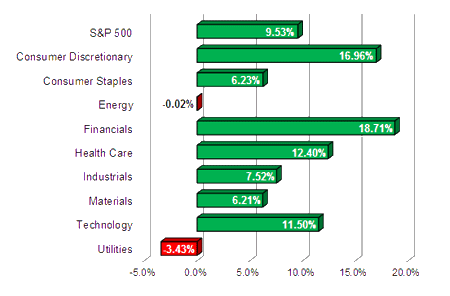
Market Commentary by Scott J. Brown, Ph.D., Chief Economist

After all the fund raising, primaries, conventions, robocalls commercials, and actual voting, the leadership in Washington remains the same. President Obama was given another four years. The Republicans retained control of the House of Representatives. The Democrats kept control of the Senate, picking up one seat despite having many more seats to defend. The stock market rallied on Election Day, despite tough odds for Governor Romney (based on the electoral map and recent polls).
The stock market fell sharply after the election results, partly reflecting disappointment that Romney didn’t win, but more importantly, as investor attention turned toward the fiscal cliff. The fiscal cliff (mostly the expiration of the Bush-era tax cuts, the end of the 2% reduction in payroll taxes, and forced spending cuts following the failure of the Super Committee last year) does not hit all at once. If a deal is not reached by the end of the year, President Obama and the new Congress have several weeks to reach a deal in 2013 before the economy weakens. Unfortunately, the two sides remain far apart on how to reduce the budget deficit.
The bond market rallied on the election results. That’s because Romney would almost certainly have replaced Fed Chairman Bernanke (when his term is up in January 2014) with someone more hawkish (that is, interest rates would have been raised sooner rather than later).Next week, the bond market is closed on Monday to honor those who have served. The mid-month economic data reports will then stream in. However, with the markets focused on the fiscal cliff, the economic data releases are likely to matter less. Retail sales figures should show some impact from Superstorm Sandy. The Fed policy meeting minutes may provide clues about what the Fed will decide in December. Fed Chairman Bernanke will speak on Thursday.
Indices
| Last | Last Week | YTD return % | |
| DJIA | 12811.32 | 13232.62 | 4.86% |
| NASDAQ | 2895.59 | 3020.061 | 11.15% |
| S&P 500 | 1377.51 | 1427.59 | 9.53% |
| MSCI EAFE | 1503.15 | 1531.52 | 6.41% |
| Russell 2000 | 793.65 | 827.85 | 7.12% |
Consumer Money Rates
| Last | 1-year ago | |
| Prime Rate | 3.25 | 3.25 |
| Fed Funds | 0.17 | 0.07 |
| 30-year mortgage | 3.41 | 4.07 |
Currencies
| Last | 1-year ago | |
| Dollars per British Pound | 1.598 | 1.608 |
| Dollars per Euro | 1.274 | 1.378 |
| Japanese Yen per Dollar | 79.660 | 77.790 |
| Canadian Dollars per Dollar | 0.998 | 1.012 |
| Mexican Peso per Dollar | 13.106 | 13.382 |
Commodities
| Last | 1-year ago | |
| Crude Oil | 85.09 | 96.80 |
| Gold | 1723.53 | 1800.50 |
Bond Rates
| Last | 1-month ago | |
| 2-year treasury | 0.26 | 0.25 |
| 10-year treasury | 1.64 | 1.84 |
| 10-year municipal (TEY) | 2.94 | 2.86 |
Treasury Yield Curve – 11/9/2012
S&P Sector Performance (YTD) – 11/9/2012
Economic Calendar
| November 12th |
— |
Veterans Day (bond market closed) |
| November 14th |
— |
Retail Sales (October) FOMC Minutes (October 23rd-24th) |
| November 15th |
— |
Jobless Claims (week ending November 10th) Consumer Price Index (October) Empire State Manufacturing Index (November) Philadelphia Fed Index (November) Bernanke Speaks (“Housing and the Mortgage Markets”) |
| November 19th |
— |
Existing Home Sales (October) |
| November 20th |
— |
Building Permits, Housing Starts (October) |
| November 22nd |
— |
Thanksgiving (markets closed) |
| November 29th |
— |
Real GDP (3Q12, 2nd estimate) |
| December 7th |
— |
Employment Report (November) |
| December 12th |
— |
FOMC Policy Decision, Bernanke Press Briefing |
Important Disclosures
Past performance is not a guarantee of future results. There are special risks involved with global investing related to market and currency fluctuations, economic and political instability, and different financial accounting standards. The above material has been obtained from sources considered reliable, but we do not guarantee that it is accurate or complete. There is no assurance that any trends mentioned will continue in the future. While interest on municipal bonds is generally exempt from federal income tax, it may be subject to the federal alternative minimum tax, state or local taxes. In addition, certain municipal bonds (such as Build America Bonds) are issued without a federal tax exemption, which subjects the related interest income to federal income tax. Investing involves risk and investors may incur a profit or a loss.US government bonds and treasury bills are guaranteed by the US government and, if held to maturity, offer a fixed rate of return and guaranteed principal value. US government bonds are issued and guaranteed as to the timely payment of principal and interest by the federal government. Treasury bills are certificates reflecting short-term (less than one year) obligations of the US government.
Commodities trading is generally considered speculative because of the significant potential for investment loss. Markets for commodities are likely to be volatile and there may be sharp price fluctuations even during periods when prices overall are rising. Specific sector investing can be subject to different and greater risks than more diversified investments.
Tax Equiv Muni yields (TEY) assume a 35% tax rate on triple-A rated, tax-exempt insured revenue bonds.
![]() Material prepared by Raymond James for use by its financial advisors.
Material prepared by Raymond James for use by its financial advisors.
The information contained herein has been obtained from sources considered reliable, but we do not guarantee that the foregoing material is accurate or complete. Data source: Bloomberg, as of close of business November 8tht, 2012.
©2012 Raymond James Financial Services, Inc. member FINRA / SIPC.




